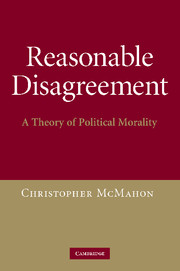3 - Agreement and disagreement
Published online by Cambridge University Press: 11 September 2009
Summary
In the previous chapter, I developed a theory of moral judgment, and moral worlds, that I called moral nominalism. Moral nominalism is a meta-ethical theory, and I believe that it has some appeal as an intermediate position between realist theories that countenance independently existing moral properties and facts, and anti-realist theories that view moral judgments as expressing attitudes that particular people simply happen to have. I suggested that it can be regarded as a constructivist view. As I have indicated, however, my principal argument for moral nominalism is that it enables us to “save the phenomenon” of reasonable moral disagreement in politics. It does not require disagreement. A certain amount of agreement concerning how political cooperation ought to be organized is to be expected under moral nominalism. But moral nominalism explains how disagreement among competent reasoners can be a persistent fact of political life. Showing this is the main task of the present chapter.
Disagreement concerning questions of fact plays a significant role in political contexts. I explained in chapter 1 how such disagreements can be reasonable. But factual judgments purporting to identify effective ways of achieving given ends presuppose evaluative and normative judgments that set the ends. In accordance with the program outlined in chapter 1, our principal focus will be judgments of the latter sort, in particular, judgments of political morality.
I have characterized reasonable disagreement as disagreement that survives, or would survive, shared deliberation conducted in good faith over an extended period of time.
- Type
- Chapter
- Information
- Reasonable DisagreementA Theory of Political Morality, pp. 68 - 97Publisher: Cambridge University PressPrint publication year: 2009



